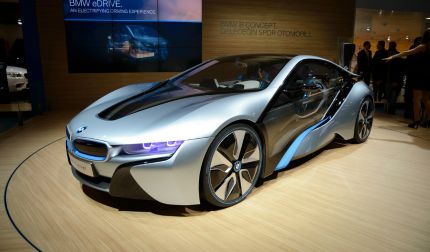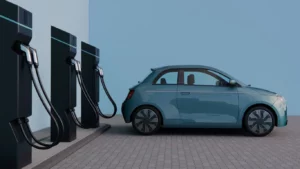Hybrid cars, the brainchild of innovative automotive engineering, combine the advantages of conventional internal combustion engines and electric propulsion. These are great for folks who want to lower their carbon footprint while enjoying traditional fueling. Hybrid cars have been around since the early 20th century, but the Toyota Prius was their market breakthrough.
Hybrid cars house complex systems, seamlessly integrating a conventional engine, an electric motor, and a rechargeable battery. Their operation relies on the ingenious principle of regenerative braking, capturing energy typically lost during braking and converting it into electricity to charge the battery. The battery also draws power directly from the engine when not needed for driving.
How Does A Hybrid Car Work?
Hybrid cars cleverly blend the power and benefits of an internal combustion engine and an electric motor. Hybrid cars work as follows:
1. Components of a Hybrid Car
Before comprehending a hybrid car’s operation, you must know its main parts:
- Gasoline Engine: An internal combustion engine powers this. It is smaller and more efficient than a car engine.
- Electric Motor: This component works both as a motor and a generator. It assists the engine in driving the wheels and acts as a generator to recover energy during braking.
- Battery Pack: This rechargeable battery stores the energy that the electric motor uses.
- Transmission: The transmission in a hybrid works like a regular car’s transmission, helping to efficiently apply the power generated by the engine and motor to the wheels.
2. Operation of a Hybrid Car
Now that we understand the components, let’s discuss how they work together:
- Starting and Low Speeds: The electric motor draws electricity from the battery to start and drive the car. This is why hybrids are very quiet and emit no exhaust fumes when starting or traveling slowly, as the gasoline engine is off.
- Acceleration and High-Speed Driving: The gasoline engine starts when the car requires greater power. This engine either directly powers the car or works in combination with the electric motor for added power.
- Regenerative Braking: One of the most clever features of a hybrid car is regenerative braking. Instead of wasting energy as heat when braking like conventional cars, hybrid vehicles capture this energy. The electric motor acts as a generator, converting and storing this energy in the battery for future use.
- Battery Charging: When additional power is available, the engine charges the battery directly, keeping it charged even on lengthy drives.
3. Power Management
Hybrid cars also have sophisticated computers onboard to manage power distribution between the engine and the electric motor. Both systems should be used efficiently to save fuel consumption and pollutants.
In conclusion, the workings of a hybrid car involve a smart interplay of mechanical, electrical, and computer engineering, aimed at maximizing fuel efficiency while reducing environmental impact. Hybrid automobiles are greener and more efficient than conventional cars because they combine gasoline engines and electric motors.
You must read this article if your car ac is facing any problem: Know the reasons why your car ac is not working
Different Types of Hybrid Cars
Hybrid cars come in different types, each offering distinct features and benefits. The main types of hybrid cars are:
1. Parallel Hybrid Cars:
This is the most common type of hybrid car. In parallel hybrids, both the internal combustion engine and the electric motor are connected to the transmission and can simultaneously transmit power to drive the wheels. Examples of parallel hybrid cars include the Toyota Prius and Honda Insight.
2. Series Hybrid Cars:
In series hybrids, the gasoline engine is not directly connected to the wheels. Instead, it charges a generator that generates electricity to power the wheels or store in the battery. Series hybrids are uncommon, but the BMW i3 REx is one.
3. Plug-in Hybrid Cars (PHEVs):
Plug-in hybrid electric vehicles, unlike ordinary hybrids, can be connected into an electrical outlet or charging station to charge their batteries. PHEVs can drive farther on electric power than hybrids due to their larger batteries. PHEVs include the Chevrolet Volt and Toyota Prius Prime.
4. Mild Hybrid Cars:
Mild hybrids use a smaller battery and motor to assist the internal combustion engine, improving efficiency. But, a mild hybrid’s electric motor isn’t powerful enough to move the automobile. It reduces gasoline engine load and saves fuel. Mild hybrids include the Honda Civic Hybrid.
5. Full Hybrid Cars:
Full hybrid cars, also known as strong hybrids, can drive on electric power alone, unlike mild hybrids. When more power is needed, the gasoline engine starts up to provide the extra power. Full hybrid cars provide better fuel efficiency than mild hybrids. The Toyota Prius is an example of a full hybrid car.
6. Power-Split Hybrid Cars:
Power-split hybrids combine the advantages of series and parallel hybrids. They can run on electricity, gas, or both. The electronic continuously variable transmission (eCVT) in these cars allows for seamless power splitting and combination. The Ford Fusion Hybrid is an example of a power-split hybrid car.
Driving demands, money, and tastes determine the best hybrid automobile. Hybrid car kinds can help customers choose.
Impact of Hybrid Cars on the Environment
Hybrids are lauded for their reduced greenhouse gas emissions, contributing significantly to environmental protection. By optimizing energy usage and minimizing waste, these cars lower harmful emissions. Furthermore, their high fuel efficiency makes them perfect for city driving, where stop-start traffic usually leads to excessive fuel consumption in conventional cars.
Economics of Owning a Hybrid Car
Hybrids cost more up front but save money over time. They offer savings on fuel costs and often have lower maintenance needs. Plus, various governments worldwide offer incentives, such as tax breaks, to promote hybrid car ownership, which can offset the initial price premium.
What Are the Advantages of a Hybrid Car?
Hybrid cars, with their gasoline engine and electric motor, have many advantages over traditional cars. Hybrid cars have these advantages:
1. Fuel Efficiency:
Hybrid cars are known for their fuel efficiency. Several methods accomplish this. Firstly, they utilize the electric motor at low speeds or when idle, which reduces gasoline usage. Regenerative braking converts kinetic energy into electrical energy, which powers the electric motor. They also have smaller, fuel-efficient engines.
2. Lower Emissions:
By using an electric motor for a significant part of their operation, hybrids emit fewer greenhouse gases compared to traditional cars. This reduced emission not only helps protect the environment but also meets stricter emission standards, making them an attractive choice in regions with high emission regulation.
3. Financial Incentives:
Many governments offer hybrid car owners tax credits, rebates, or exemptions to encourage their use. These financial incentives can make purchasing a hybrid car more affordable.
4. Energy Independence:
Hybrid cars reduce the dependency on fossil fuels by using electric power for a part of their operation. This is especially beneficial in times of fluctuating fuel prices.
5. Versatility:
Unlike electric cars that need charging stations, hybrids don’t require infrastructure changes because they can be refueled at regular gas stations. They are more practical for many drivers, especially long-distance ones.
6. Resale Value:
With increasing awareness and demand for environmentally friendly vehicles, hybrid cars often hold their value better than traditional cars, making them a good investment.
7. Reduced Noise Pollution:
When operating in electric mode, hybrid cars produce less noise compared to when they’re running on gasoline engines. This can contribute to lower noise pollution, particularly in urban settings.
8. Technological Innovation:
Hybrid cars often come equipped with advanced technology not only in terms of their hybrid powertrain but also in vehicle features. Modern infotainment, driver-assistance, and comfort technologies are included.
In conclusion, hybrid cars offer a balanced compromise between the familiarity and convenience of conventional cars and the environmental benefits of electric vehicles. They present a practical and environmentally conscious choice for the modern driver.
What Are the Disadvantages of a Hybrid Car?
While hybrid cars have numerous advantages, they also come with certain drawbacks. Hybrid cars have certain drawbacks:
1. High Initial Cost:
Hybrid cars tend to be more expensive than their conventional counterparts. The cost of the technology, such as the electric motor and battery, contributes to this higher initial price. However, this cost is often offset over time through fuel savings and government incentives.
2. Limited Range in Electric-Only Mode:
Hybrid automobiles’ electric-only range is usually substantially lower than fully electric cars’. Hybrids use fuel when their electric range runs out.
3. Battery Replacement Costs:
Hybrid car batteries don’t last forever. It’s expensive to replace a hybrid automobile battery. Hybrid battery warranties are often extended.
4. Lower Power:
While hybrid cars are great for fuel efficiency, some drivers feel that they lack the power and performance of conventional gasoline cars, especially in models where the focus is on maximizing fuel efficiency. However, many automakers now offer performance-oriented hybrids that combine efficiency with impressive power.
5. Less Efficient on Highways:
Hybrid cars are most efficient in city driving where they can utilize their electric motor. In contrast, on highways and at high speeds, the gasoline engine is used more, making them less efficient in these conditions compared to city driving.
6. Limited Models to Choose From:
While the number of hybrid models is increasing, the choices are still not as extensive as conventional cars. This might make it challenging to find a hybrid that fits specific needs or preferences.
7. Complexity of Hybrid Systems:
The complexity of the hybrid powertrain system can lead to higher maintenance costs, especially when repairs involve the electric motor or battery. Not all mechanics are trained to work on hybrid systems, which could limit where you can get your car serviced.
While hybrid cars present certain drawbacks, they are continually evolving. Advances in technology are addressing many of these issues, making hybrids an increasingly viable option for many drivers. Hybrid automobile buyers should know their pros and cons.
Does a Hybrid Car Uses Electric or Gas?
Hybrid cars run on gasoline and electricity. Hybrid cars have a dual power source.
The gasoline component of a hybrid car works similarly to that of a conventional car. Gasoline powers its internal combustion engine. This power is then used to drive the vehicle forward.
The electric component has a motor and battery pack. The electric motor can power the vehicle independently at lower speeds, providing a quiet, emission-free driving experience.
A hybrid car’s strength is its ability to easily transition between these two power sources or use them concurrently. The car’s onboard computer system determines the most efficient use of the gasoline engine and electric motor based on driving conditions.
For instance, during city driving or when in stop-and-go traffic, the electric motor often powers the vehicle. At higher speeds or when more power is needed, such as when accelerating quickly or driving uphill, the gasoline engine takes over. Gasoline engines and electric motors may work together to boost power.
Regenerative braking turns energy from braking into electricity to charge hybrid automobiles’ batteries. This energy would otherwise be lost in a conventional car.
It’s worth noting that there are also plug-in hybrid cars that can be plugged into an electric outlet to charge the battery, offering a longer electric-only range compared to standard hybrid cars. Once the battery is depleted, they function like regular hybrid cars, using both the gasoline engine and electric motor.
A hybrid car uses both gasoline and electricity in a way that aims to maximize efficiency and minimize emissions.
Why are Hybrid Cars Popular?
Hybrid cars have been gaining popularity for various reasons, underpinned by global trends and individual benefits. Key reasons for their rising popularity:
1. Environmental Awareness:
Many people want to lower their carbon footprint as knowledge of climate change and environmental preservation grows. Hybrid automobiles emit fewer greenhouse gases than conventional cars.
2. Fuel Efficiency:
Hybrid cars are designed to optimize fuel consumption. In stop-and-go traffic or at low speeds, they employ an electric motor instead of a gas engine. They are fuel-efficient, especially in city driving, saving fuel expenditures over time.
3. Government Incentives:
Hybrid and electric car incentives are offered by many countries. Tax credits, rebates, and fee exemptions are examples. These subsidies make hybrid cars more affordable.
4. Energy Independence:
Hybrid cars reduce dependency on fossil fuels by using electricity for a significant portion of their operation. This independence from volatile fuel prices is another factor that makes hybrids popular.
5. Technological Advancements:
Hybrid autos are now more reliable and efficient due to technology advances. Regenerative braking, high-end electronics, and driver-assistance systems make hybrids more appealing.
6. Broadening Range of Options:
Hybrids were scarce at first. Many automakers now offer hybrid cars due to increased interest in hybrid technology. Buyers have more possibilities to find a vehicle they want.
7. Transition to Electric Vehicles:
Hybrid cars can serve as a stepping stone for those interested in electric vehicles but concerned about range anxiety or lack of charging infrastructure. Hybrids offer the benefits of electric propulsion without the same level of dependency on charging infrastructure.
Hybrid automobiles’ environmental, economic, and practical benefits are driving their appeal. They offer a sustainable and effective transportation option.
Hybrid Cars and the Automotive Industry
Hybrid cars have left a profound impact on the automotive industry. With industry giants like Toyota, Honda, and Ford pioneering hybrid technology, an array of hybrid models are available today. Looking forward, the hybrid technology is expected to evolve further, possibly becoming a stepping stone towards fully electric cars.
Frequently Asked Questions about Hybrid Cars
Hybrid cars have gasoline engines and electric motors. This combo attempts to improve fuel efficiency and emissions over traditional autos.
A hybrid car uses its electric motor and gasoline engine in tandem for maximum efficiency. The gasoline engine kicks in at faster speeds or when more power is needed, while the electric motor is employed at low speeds.
Hybrid automobiles run on electric power part of the time, thus they release less carbon dioxide and other pollutants than traditional cars.
Due to technology costs, hybrid automobiles cost more than non-hybrids. However, they can often be more economical in the long run due to fuel savings and potential government incentives.
An electric car runs solely on electricity and needs to be charged at a charging station. Hybrid cars generate power as they run and don’t need to be plugged in.
Hybrid cars usually require similar levels of maintenance to conventional cars for components like tires, brakes, and the gasoline engine. However, their hybrid-specific components, such as the battery, typically require less frequent maintenance.
Yes, if a hybrid car’s battery runs out of charge, it can operate on gasoline alone. The car’s onboard computer ensures seamless switching between the two power sources.
Plug-in hybrid cars can be charged at an electric outlet or charging station. It typically has a larger battery and can travel longer distances on electric power alone compared to a regular hybrid.
Yes, when operating in electric mode, hybrid cars are typically quieter than traditional vehicles that are powered solely by a gasoline engine.
Hybrid automobile batteries typically last 100,000 to 150,000 kilometers. Many manufacturers also offer warranties on their hybrid batteries.
Conclusion
Hybrid cars represent a crucial step towards sustainable mobility, offering an accessible alternative to fully electric vehicles. By reducing emissions and optimizing energy usage, they contribute to a greener future, all while providing the convenience of traditional fueling. Embracing hybrid cars is a conscious step forward in aligning our commuting habits with our commitment to environmental stewardship.
While this article offers a comprehensive view of hybrid cars, it’s important to consider specific models and their individual features when thinking about making a purchase. Always consider factors like your driving habits, commute length, and local incentives when choosing a hybrid vehicle.






